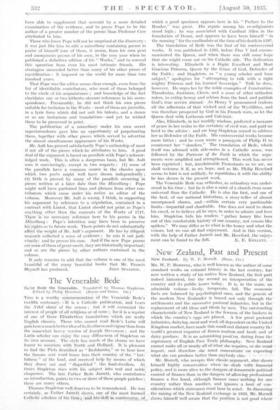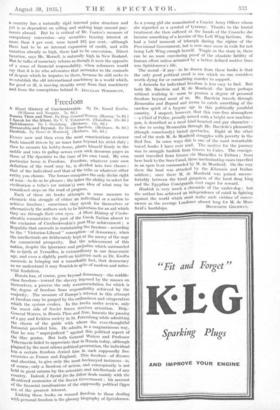New Zealand, Past and Present
New Zealand. By W. P. Morrell.. (Bonn. 21s.).
Mn. W. P. Moname, who is well: known as the author of some standard works on 'colonial history in the last century, haa ' now written a study of his native New Zealand, the first :p'a'rt indeed historical, but the second an interpretation of the country • and its public issues today. It is, in' the main; an admirable volume—lively, temperate, full. : The economic facts arc balanced. by •psychological ;ones, and: the genesis of the modern New Zealander is traced: not only through the ' settlements and the successive pastoral 'industries, but' in the replacement of old ideas and ideals by now. The 'outstanding' characteristic of New Zealand is:the fewness of the baSkets in which the .country's eggs are placed. • -A few great: pastoral industries, dairying, meat and wool; all dependent on the United Kingdom market, have made 'this 'small and distant country the world's greatest exporter of • frozen mutton. and lamb and of dairy.,produce. •It :is' an astonishing position, dating from th., • supremacy of :English, Free Trade philosophy. New Zealand cannot make all or nearly all of What 'she requires; ,sci she mist' import, and -therefore she must. 'concentrate .on. exporting -what she can produce. better than anybody else.
Mr. Morrell,: who-accepts this elaSst6 argument, also shows.. himself highly conservative when:, he,Ideals with financial' policy, and is more alive to the dangers of dernoeratic political' control of finance than to the dangers' of.allolwing professional ' finance .a free hand, although finance cares nothing 'for one, country rather than another, ' and -ignores a host of con-' siderations which statesmen must bear 'in mind. In disenssing the, raising of the New Zealand exchange in 1933, Mr. Morrell shows himself well aware that the position is not good Where a country has a naturally rigid internal price structure and yet is so dependent on selling and Making huge annual paY- ments abroad. But he is critical of Mr. Coates's measure of compulsory conversion—any securities bearing interest at more than 4 per cent. were taxed NI per cent.—although there had to be an internal expansion of credit, and with taxation already so high, there had to be conversion. Direct taxation, says Mr. Morrell, is naturally high in New Zealand. But he talks of monetary reform as though it were the opposite of a sense of financial responsibility, when reformers would say that it is he who advocates that surrender to the counsels of despair which he imputes to them, because he still seeks to re-establish the old international machinery in a world which, for good or ill, is moving steadily away from that machinery and from the conceptions behind it. DOUGLAS WOODRUFF.



































 Previous page
Previous page